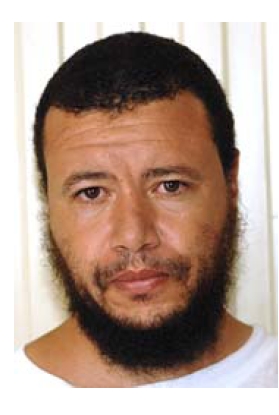Yunis Abdurrahman Shokuri
 | |
| Born | 1968-04-05 Asafi, Morocco |
| Occupation | charity worker |
| Victim of | • torture • indefinite detention |
Held in extrajudicial detention in Guantanamo Bay | |
Yunis Abdurrahman Shokuri is a citizen of Morocco who was held in extrajudicial detention in the United States Guantanamo Bay concentration camps, in Cuba.[1]
Contents
- 1 Press reports
- 2 Official status reviews
- 2.1 Office for the Administrative Review of Detained Enemy Combatants
- 2.2 Combatant Status Review Tribunal
- 2.3 Administrative Review Board hearing
- 2.4 Second annual Administrative Review Board
- 2.5 Habeas corpus petition
- 2.6 Publication of captives' CSR Tribunal documents
- 2.7 Formerly secret Joint Task Force Guantanamo assessment
- 3 Release and disappearance
- 4 External links
- 5 References
Press reports
On July 12, 2006 the magazine Mother Jones provided excerpts from the transcripts of a selection of the Guantanamo detainees.[2] Shokuri was one of the detainees profiled. According to the article his transcript contained the following comment:
- [T]he only way I know the United States is through movies from Hollywood or through cartoons. I’m a big fan of a lot of their singers…. [T]he first time I saw an American soldier was at Kandahar Air Base…. When I first saw myself in Kandahar, it was like I was in a cinema or a movie. I saw a 1996 movie called The Siege. The movie was about terrorists carrying out terrorist attacks in the United States…. [In the movie] the CIA and FBI were not successful in finding that terrorist group and the United States Army interfered and gathered all the people of Arabic descent and put them in a land cage or camp just like it happened in Kandahar. I was shocked, thinking, “Am I in that movie or on a stage in Hollywood?”… Sometimes I laugh at myself and say, “When does that movie end?”
Official status reviews
Originally the Bush Presidency asserted that captives apprehended in the "war on terror" were not covered by the Geneva Conventions, and could be held indefinitely, without charge, and without an open and transparent review of the justifications for their detention.[3] In 2004 the United States Supreme Court ruled, in Rasul v. Bush, that Guantanamo captives were entitled to being informed of the allegations justifying their detention, and were entitled to try to refute them.
Office for the Administrative Review of Detained Enemy Combatants
Following the Supreme Court's ruling the Department of Defense set up the Office for the Administrative Review of Detained Enemy Combatants.[3]
Combatant Status Review Tribunal
Initially the Bush administration asserted that they could withhold all the protections of the Geneva Conventions to captives from the war on terror. This policy was challenged before the Judicial branch. Critics argued that the USA could not evade its obligation to conduct a competent tribunals to determine whether captives are, or are not, entitled to the protections of prisoner of war status.
Subsequently the Department of Defense instituted the Combatant Status Review Tribunals. The Tribunals, however, were not authorized to determine whether the captives were lawful combatants — rather they were merely empowered to make a recommendation as to whether the captive had previously been correctly determined to match the Bush administration's definition of an enemy combatant.
Summary of Evidence memo
A Summary of Evidence memo was prepared for Shokuri Yunis Abdurrahman's Combatant Status Review Tribunal, on 16 November 2004.[4][5] The memo listed the following allegations against him:
|
Transcript
Shokuri chose to participate in his Combatant Status Review Tribunal.[7]
The allegations were read aloud, and recorded in Shokuri's transcript.[8] The version read aloud did not have his position within the GICM—he was the head of the GICM's Military Commission. The version read aloud listed fewer terrorist groups associated with the GICM.
Opening statement
Shokuri said that all the detainees he had talked with, who had been allowed to meet with the lawyers handling their habeas corpus cases had been told they should not participate in their Combatant Status Review Tribunal.[7] But Shokuri said he chose to participate anyhow, because he had faith in his total innocence.
Shokuri said he had lived for six years in Pakistan, where he studied and did humanitarian work. Following his stay in Pakistan he traveled to Yemen and Syria. During the summer of 2001 he traveled to Afghanistan — for humanitarian work.
Testimony
Administrative Review Board hearing

Detainees who were determined to have been properly classified as "enemy combatants" were scheduled to have their dossier reviewed at annual Administrative Review Board hearings. The Administrative Review Boards weren't authorized to review whether a detainee qualified for POW status, and they weren't authorized to review whether a detainee should have been classified as an "enemy combatant".
They were authorized to consider whether a detainee should continue to be detained by the United States, because they continued to pose a threat—or whether they could safely be repatriated to the custody of their home country, or whether they could be set free.
First annual Administrative Review Board
A Summary of Evidence memo was prepared for Yunis Abdurrahman Shokuri's first annual Administrative Review Board, on 26 October 2005.[10] The memo listed factors for and against his continued detention.
The following primary factors favor continued detention
|
The following primary factors favor release or transfer
|
Statement
The Department of Defense released a brief statement Yunis Abdulrahman wrote[11]:
|
During his second annual Administrative Review Board he referred to attending his earlier Board.[12] The Department of Defense has not explained why this transcript was withheld.
Second annual Administrative Review Board
A Summary of Evidence memo was prepared for Ahmad Abdullah Al Wazan's second annual Administrative Review Board, on 19 September 2006.[13] The memo listed factors for and against his continued detention.
The following primary factors favor continued detention
|
The following primary factors favor release or transfer
|
Transcript
The Department of Defense released a 15 page summarized transcript.[12]
Habeas corpus petition
Shokuri had a writ of habeas corpus filed on his behalf.
On 15 July 2008 Jan K. Kitchel filed a "PETITIONER'S REQUEST FOR 30-DAY NOTICE OF REMOVAL OR TRASFER" on Shokuri's behalf in Civil Action No. CV 05-0329 (HHK). [14] The petition would prevent the Department of Defense from transferring him out of US jurisdiction without giving his attorney's thirty days notice. The Department of Defense had transferred some captives to countries where they were subsequently subjected to abusive treatment—even though they had active habeas corpus petitions.
Publication of captives' CSR Tribunal documents
In September 2007 the Department of Justice published dossiers of unclassified documents arising from the Combatant Status Review Tribunals of 179 captives.[15] Shokuri's was not one of the dossiers that was published.
Formerly secret Joint Task Force Guantanamo assessment
On April 25, 2011, whistleblower organization WikiLeaks published formerly secret assessments drafted by Joint Task Force Guantanamo analysts.[16][17] The reference name on Shokuri's thirteen page assessment was "Ahmad Abdullah al-Wazan".[18] It was dated November 3, 2008, and was signed by commandant David M Thomas, who recommended continued detention.[19]
Release and disappearance
Various press reports assert that Shokure was transferred back to Morocco on October 12, 2006.[20] But his name was not present on a list the Department of Defense published of the captives transferred from Guantanamo prior to October 9, 2008.[21]
External links
- Who Are the Remaining Prisoners in Guantánamo? Part Three: Captured Crossing from Afghanistan into Pakistan (1 of 2) Andy Worthington, September 22, 2010
- Yunis Abdurrahman Shokuri - biography
References
- ↑ http://www.dod.mil/news/May2006/d20060515%20List.pdf
- ↑ "Why Am I in Cuba?", Mother Jones (magazine), July 12, 2006
- ↑ a b http://www.webcitation.org/query?url=http%3A%2F%2Fwww.usatoday.com%2Fnews%2Fwashington%2F2007-10-11-guantanamo-combatants_N.htm&date=2012-08-11 quote= Critics called it an overdue acknowledgment that the so-called Combatant Status Review Tribunals are unfairly geared toward labeling detainees the enemy, even when they pose little danger. Simply redoing the tribunals won't fix the problem, they said, because the system still allows coerced evidence and denies detainees legal representation.
- ↑ http://www.dod.mil/pub/foi/detainees/csrt_Mar05.pdf#69
- ↑ http://www.dod.mil/pubs/foi/detainees/csrt_arb/000201-000299.pdf#9
- ↑ The phrase "head of the Military Commission" was redacted when this memo was first released in March 2005.
- ↑ a b [DoD detainees ARB|Set_36_2493-2577.pdf#70 Summarized transcripts (.pdf)], from Yunis Abdurrahman Shokuri's Combatant Status Review Tribunal - pages 70-85
- ↑ [DoD detainees ARB|Set_36_2493-2577.pdf Summarized transcripts (.pdf)], from Yunis Abdurrahman Shokuri's Combatant Status Review Tribunal - pages 70-85
- ↑ http://www.jtfgtmo.southcom.mil/wire/WirePDF/v6/TheWire-v6-i049-10MAR2006.pdf#1
- ↑ http://www.dod.mil/pubs/foi/detainees/csrt_arb/ARB_Round_1_Factors_000197-000294.pdf#38
- ↑ http://www.dod.mil/pubs/foi/detainees/csrt_arb/ARB_Transcript_Set_5_20000-20254.pdf#196
- ↑ a b http://www.dod.mil/pubs/foi/detainees/csrt_arb/ARB_Transcript_2100-2195.pdf
- ↑ http://www.dod.mil/pubs/foi/detainees/csrt_arb/ARB_Round_2_Factors_299-398.pdf#4
- ↑ http://docs.justia.com/cases/federal/district-courts/district-of-columbia/dcdce/1:2008mc00442/131990/64/0.pdf
- ↑ http://www.dod.mil/pubs/foi/detainees/csrt_arb/index_publicly_filed_CSRT_records.pdf
- ↑ http://www.telegraph.co.uk/news/worldnews/wikileaks/8471907/WikiLeaks-Guantanamo-Bay-terrorist-secrets-revealed.html quote = The Daily Telegraph, along with other newspapers including The Washington Post, today exposes America’s own analysis of almost ten years of controversial interrogations on the world’s most dangerous terrorists. This newspaper has been shown thousands of pages of top-secret files obtained by the WikiLeaks website.
- ↑ http://www.telegraph.co.uk/news/wikileaks-files/guantanamo-bay-wikileaks-files/8476672/WikiLeaks-The-Guantanamo-files-database.html
- ↑ http://www.telegraph.co.uk/news/wikileaks-files/guantanamo-bay-wikileaks-files/8477151/Guantanamo-Bay-detainee-file-on-Younis-Abdurrahman-Chekkouri-US9MO-000197DP.html
- ↑ http://media.mcclatchydc.com/smedia/2011/04/27/19/us9mo-000197dp.source.prod_affiliate.91.pdf
- ↑ http://www.iht.com/bin/print_ipub.php?file=/articles/ap/2006/10/23/africa/AF_GEN_Morocco_Guantanamo.php
- ↑ http://www.dod.mil/pubs/foi/detainees/09-F-0031_doc1.pdf